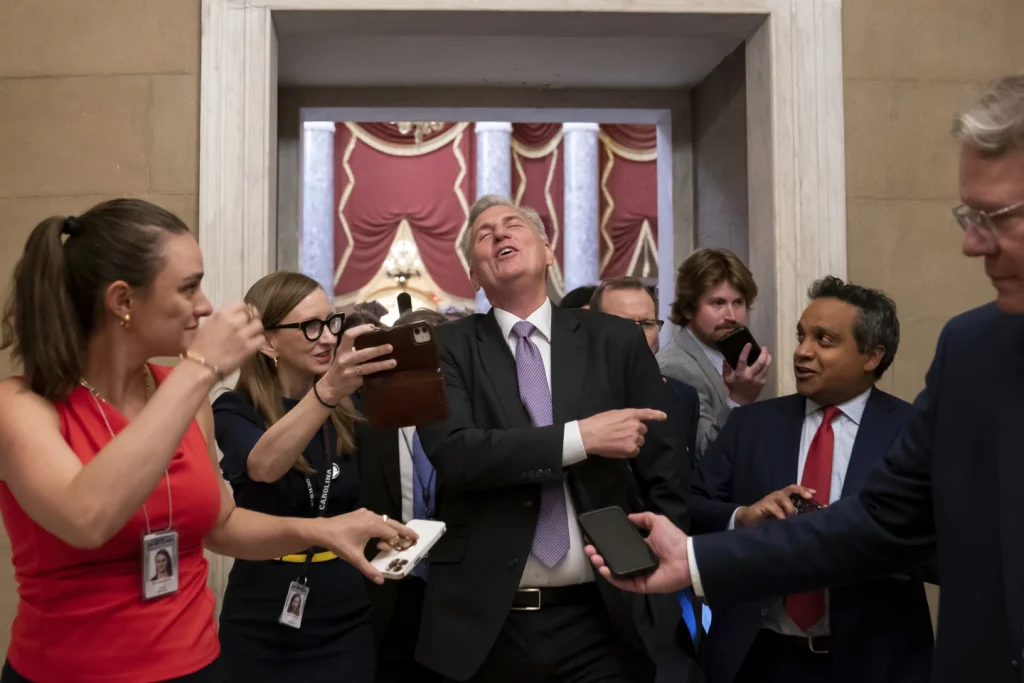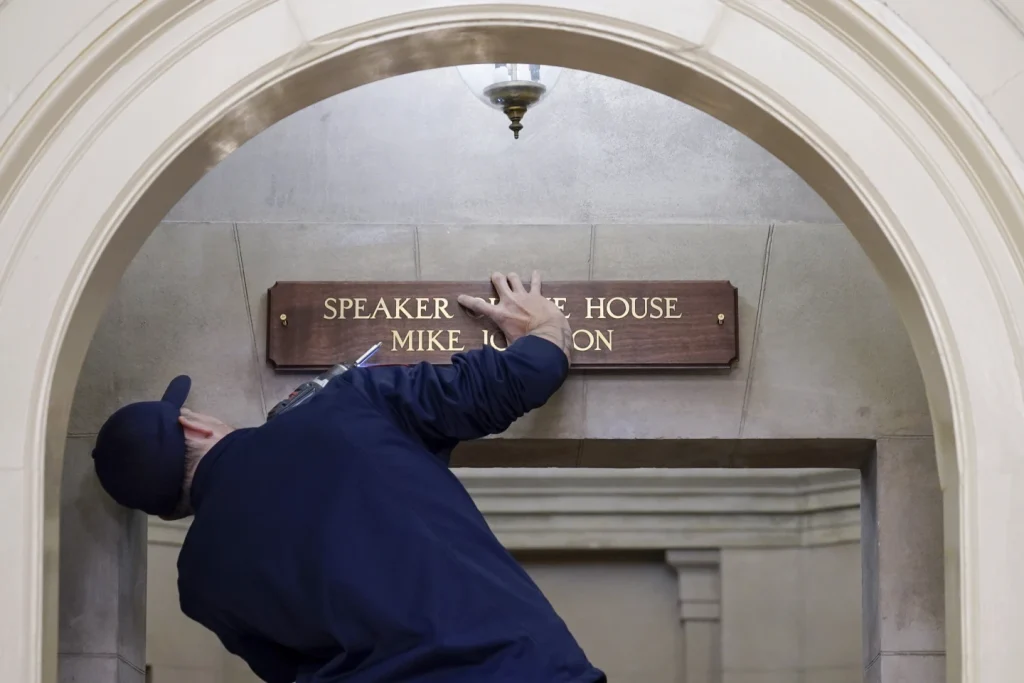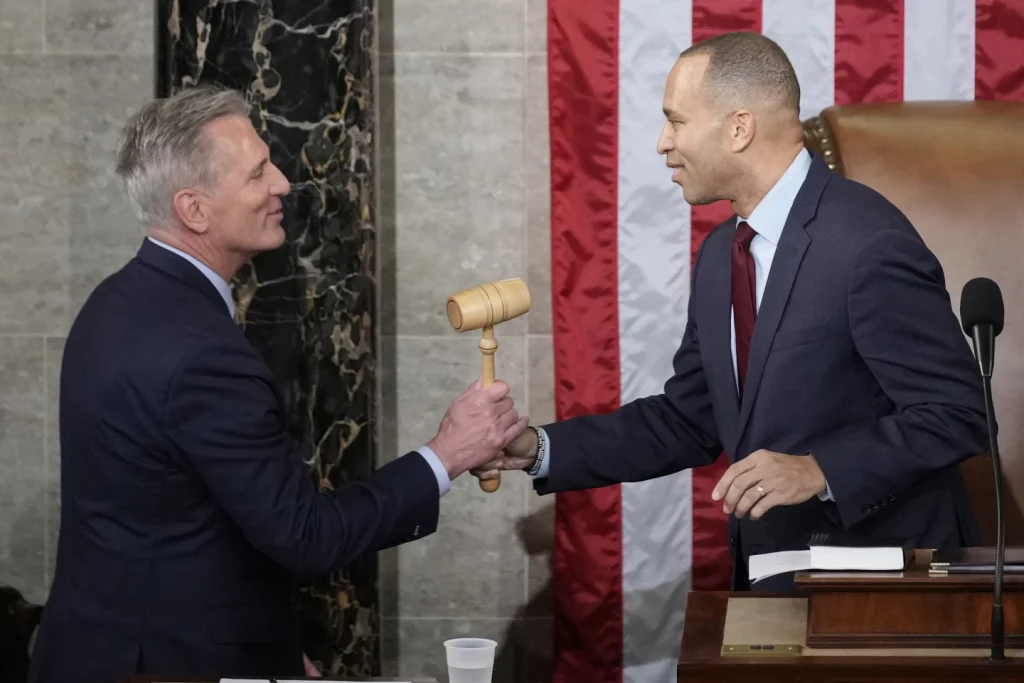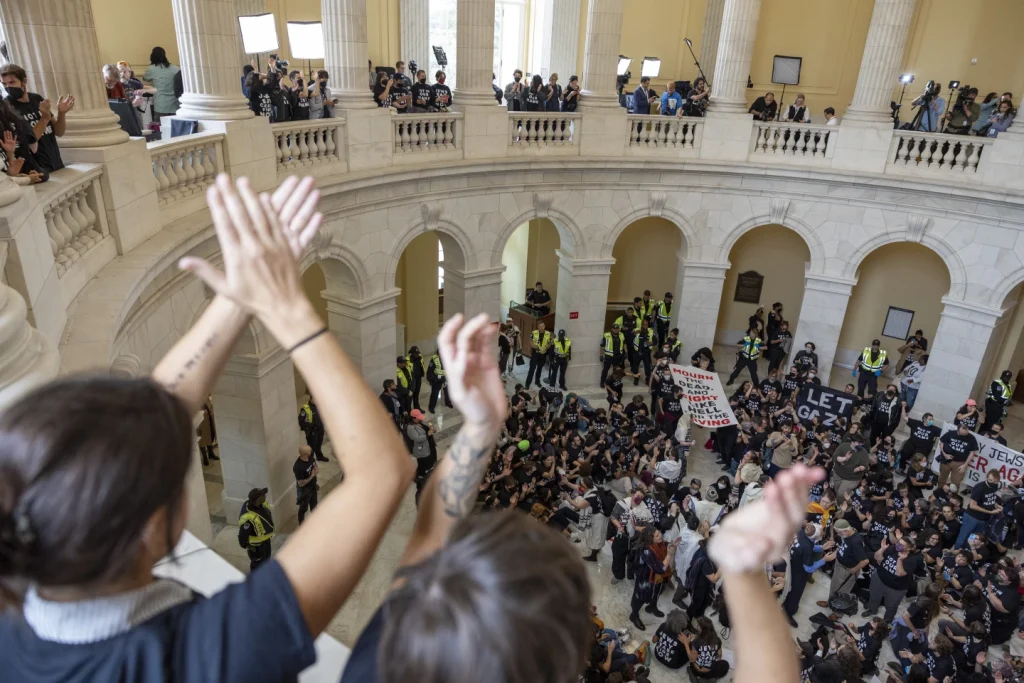The 118th Congress commenced with a spectacle of showy bluster, marked by a bitter 15-round, multi-day spectacle to elect a House speaker.
The ensuing events bore witness to a Republican speaker who vowed to “never quit,” only to subsequently resign.
The House of Representatives, in an unprecedented move, not only deposed the GOP speaker but also meted out censures and expulsions to its own members.
Furthermore, the chamber launched an impeachment inquiry into President Joe Biden, struggling to maintain the basic functions of governance and prevent federal offices from closing.
This first year of the 118th Congress was indeed historic, largely due to the dizzying turmoil emanating from the Republicans within the hallowed halls of the Capitol.
Regrettably, the trajectory for the following year appears to be more of the same. The legislative output, with a mere 27 bills and resolutions signed into law (excluding a handful of board appointments), ranks among the most unproductive sessions of Congress in recent memory.
As Rep. Patrick McHenry, the bow-tie-wearing Republican from North Carolina, aptly put it, “This fall has been a very actively stupid political environment.”
Amidst the upheaval, he emerged as a voice of reason, assuming the role of interim House speaker. While Americans traditionally assign low marks to Congress, as the branch of government closest to the people, it remains the primary platform upon which the United States relies to address the nation’s problems and challenges, often more so than the presidency or the courts.
The necessity for a functional Congress, often referred to as “the place” where it all happens, becomes even more apparent as we approach a tumultuous presidential election year, compounded by ongoing conflicts in Ukraine and the Middle East.
Philip Wallach, author of “Why Congress” and a senior scholar at the American Enterprise Institute think tank in Washington, encapsulated the prevailing sentiment when he remarked, “People’s expectations for this Congress were so low, and so just doing the bare minimum seems like a passing grade.”
The current state of Congress raises profound concerns about the institution’s ability to fulfill its constitutional duties effectively.
The lack of meaningful legislative accomplishments and the prevalence of internal strife and partisan bickering have eroded public trust in the legislative process.

The American people, who look to Congress as a beacon of democracy, are left disillusioned by the apparent dysfunction and gridlock that have come to define the institution.
The challenges facing Congress are multifaceted and demand urgent attention. The need for bipartisan cooperation, principled leadership, and a renewed commitment to the common good has never been more pressing.
As we navigate through the complexities of a rapidly changing world, Congress must rise to the occasion, transcending political divides and working tirelessly to address the critical issues that confront the nation.
In conclusion, the 118th Congress has been marred by tumult and inaction, raising serious questions about its ability to effectively serve the American people.
As we look ahead, the imperative for meaningful reform and a reinvigorated sense of purpose within Congress has never been clearer.
The nation’s future hinges on the ability of Congress to rise above the current state of disarray and chart a path towards progress and unity.
The current state of Congress is one of turmoil and dysfunction, with deep-seated issues that have led to a breakdown in institutional and cultural norms.
This has resulted in a toxic atmosphere of bad feelings and a desire to lash out across party lines. As a result, the upcoming year presents its own set of challenges, particularly with the potential rematch between President Biden and former President Trump, who is currently the front-runner for the Republican party.
The aftermath of Trump’s loss in the 2020 election has been marked by his supporters’ siege on the U.S. Capitol, leading to a charge of insurrection and his second impeachment.
Despite being acquitted by the Senate, the repercussions of his actions continue to loom over the political landscape, with the potential threat of his removal from the Colorado ballot.
Senate Majority Leader Chuck Schumer has acknowledged the shadow cast by Trump’s influence, stating that the GOP is struggling to find its way forward.
However, he remains determined to persevere and has outlined a list of bills aimed at addressing critical issues such as lowering the price of insulin and ensuring child safety online.
The dysfunction within Congress is evident in both chambers, with the House Republicans leading the chaos and the Senate, typically known for its moderation, also facing its own challenges.
The actions of individual senators, such as Sen. Tommy Tuberville’s blocking of military officer promotions, have further contributed to the crisis within the Defense Department.
Additionally, the failure to broker a U.S.-Mexico border security deal and provide military aid to Ukraine, despite a personal plea from President Volodymyr Zelenskyy, highlights the lack of productivity and effectiveness within the Senate.

Senate Republican Leader Mitch McConnell has expressed his dissatisfaction with the current state of affairs and hopes for improvement in the future.
The influence of Trump is particularly evident in the border security talks, as his inflammatory language regarding immigrants has put pressure on the Republican party to follow his lead.
This has further exacerbated the already tense political climate and hindered progress on critical issues such as providing aid to Ukraine.
Despite the challenges and shortcomings of the current Congress, there remains a sense of hope and determination among certain members. Sen.
Mark Warner, chairman of the Intelligence Committee, has expressed his disappointment at the failure to approve Ukraine aid but remains confident that it will be addressed in the new year.
In conclusion, the state of Congress is one of turmoil and dysfunction, with deep-seated issues that have led to a breakdown in institutional and cultural norms.
The influence of former President Trump continues to cast a shadow over the political landscape, hindering progress on critical issues and perpetuating a toxic atmosphere of division.
However, there remains hope for improvement and a renewed sense of determination among certain members to address the challenges ahead.

Heading into 2024, the political landscape in the United States is poised for significant change as new House Speaker Mike Johnson prepares to take the reins.
The pressures and challenges that confront him mirror the tumultuous events that led to the ouster of his predecessor, Speaker Kevin McCarthy.
The need to pass crucial legislation to fund the government, commencing on January 19, looms large, and the dynamics within the Republican party are shaping the political narrative in unprecedented ways.
The ascendancy of the hard-right Freedom Caucus and its allies, many of whom are aligned with former President Trump, has exerted a profound influence, compelling a reevaluation of traditional power structures within the GOP.
The refusal of these factions to acquiesce to compromises emanating from the Speaker’s office has upended the established hierarchy, prompting a bottom-up approach that challenges the authority of Republican leadership.
This shift in power dynamics is evidenced by the deployment of seldom-utilized procedural tactics by the GOP’s right flank.
Privileged resolutions have been leveraged to censure Democrats and initiate impeachment proceedings against President Biden and other officials, effectively wresting control of the House floor.
The utilization of such tactics, reminiscent of the “motion to vacate” that precipitated McCarthy’s removal, underscores the escalating tensions within the party.
Moreover, the erosion of support for procedural rules among Republican lawmakers has stymied the advancement of significant legislation.
This has compelled Republican speakers to seek assistance from Democrats to secure the passage of key bills, such as those pertaining to government funding and military programs.
The resulting reliance on cross-party collaboration marks a departure from the traditional modus operandi of the GOP, underscoring the profound challenges confronting the party’s leadership.
In a notable departure from the tenure of former Speaker Nancy Pelosi, whose authoritative wielding of the gavel engendered both political trepidation and legislative accomplishments, the current climate is marked by a palpable sense of upheaval.

The contrast with the previous Congress, which achieved remarkable productivity by passing over 300 pieces of legislation, including significant measures addressing infrastructure and climate change, serves as a poignant reminder of the shifting tides within the House of Representatives.
The aftermath of McCarthy’s departure has reverberated throughout the party, with a notable exodus of lawmakers opting to retire from their positions.
This exodus, coupled with the increasing consolidation of power among far-right colleagues, underscores the profound realignment occurring within the Republican party.
The sentiments expressed by influential figures, such as interim Speaker McHenry, who emphasized the need for pragmatism over ideological rigidity, reflect the deep-seated tensions and ideological fault lines that are reshaping the party’s identity.
As the political landscape continues to evolve, the challenges facing Speaker Johnson and the broader Republican leadership are multifaceted and complex.
The imperative to navigate the demands of a resurgent hard-right faction while seeking to enact meaningful legislative measures poses a formidable test.
Against this backdrop, the coming year promises to be a pivotal juncture in the trajectory of the Republican party, with far-reaching implications for the nation’s governance and political discourse.
